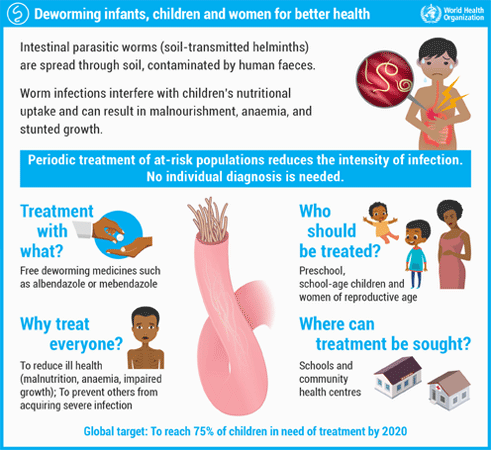Governance
Deworming in India
- 24 Oct 2020
- 5 min read
Why in News
As per the Ministry of Health and Family Welfare, states in India have witnessed reduction in worm prevalence.
- Regular deworming as advised by the World Health Organization (WHO) eliminates worm infestation among children and adolescents living in areas with high Soil-Transmitted Helminthiases (STH) burden, thereby contributing to achieve better nutrition and health.
- Helminthiases is infestation with or disease caused by parasitic worms.
Key Points
- Background:
- As per WHO Report on STH published in 2012, in India there were an estimated 64% children in the age group (1-14 years) at risk of STH.
- The risk was estimated based on the hygiene and sanitation practices and limited STH prevalence data at that point of time.
- To assess the exact burden of STH in India, the Ministry of Health and Family Welfare appointed the National Centre for Disease Control (NCDC) as the nodal agency to coordinate and conduct nationwide baseline STH mapping.
- The baseline STH mapping across the country was completed by the end of 2016. The data showed varied prevalence ranging from 12.5% in Madhya Pradesh to 85% in Tamil Nadu.
- To evaluate the impact of the consistently implemented high coverage National Deworming Day (NDD) programme, the Ministry recently initiated follow-up prevalence surveys led by NCDC and partners.
- As per WHO Report on STH published in 2012, in India there were an estimated 64% children in the age group (1-14 years) at risk of STH.
- Result of the Follow-up Surveys: The follow-up surveys are completed in 14 States.
- All 14 States have shown reduction in the follow up survey compared to the baseline prevalence survey.
- The States of Chhattisgarh, Himachal Pradesh, Meghalaya, Sikkim, Telangana, Tripura, Rajasthan, Madhya Pradesh and Bihar have shown substantial reduction in worm prevalence in the STH follow up prevalence survey.
- Chhattisgarh has successfully conducted 10 rounds of NDD as on date, and the drop in prevalence has been significant from 74.6% in 2016 to 13.9% in 2018.
- Sikkim, with 9 rounds, has seen reduction from 80.4% in 2015 to 50.9% in 2019.
- Rajasthan, the State that implemented an annual round only due to low baseline of 21.1 in 2013 has seen significant reduction to the level of less than 1% in 2019 as per the survey.
National Deworming Day Programme
- Implementation of NDD is led by the Ministry of Health and Family Welfare, in collaboration with the Ministry of Women and Child Development, Ministry of Education and technical assistance from WHO and the technical partners. It was launched in 2015.
- It is implemented as a biannual single day programme (10th February and 10th August) through the platforms of schools and anganwadis.
- In the last round of deworming earlier this year in the country (which was halted due to the Covid pandemic), 11 crore children and adolescents were administered Albendazole tablets across 25 States/UTs.
- Albendazole tablet, approved by the WHO, is used for treatment of intestinal worms in children and adolescents as part of Mass Drug Administration (MDA) programmes globally.
Soil-Transmitted Helminths
- Soil-Transmitted Helminths refer to the intestinal worms infecting humans that are transmitted through contaminated soil.
- Intestinal worms are parasites that live in the human intestines and consume nutrients and vitamins needed for a child.
- There are three main types of helminths that infect people, roundworm (Ascaris lumbricoides), whipworm (Trichuris trichiura) and hookworms (Necator americanus and Ancylostoma duodenale).
- These worms depend on the human body for their food and survival and while being there, they lay thousands of eggs each day.
- Transmission:
- Soil-transmitted helminths are transmitted by eggs that are passed in the faeces of infected people. In areas that lack adequate sanitation, these eggs contaminate the soil.
- Impact:
- Since worms feed on host (human body) tissues, including blood, it leads to loss of iron, and protein, resulting in anaemia – reduced oxygen carrying capacity due to less Haemoglobin (Hb) available in the body.
- Worm infection can also lead to diarrhoea; dysentery; loss of appetite; reduced nutritional intake and physical fitness; increased malabsorption – a condition that prevents absorption of nutrients through the small intestine.
- Treatment:
- The WHO recommended medicines – albendazole (400 mg) and mebendazole (500 mg) – are effective, inexpensive and easy to administer by non-medical personnel (e.g. teachers).







